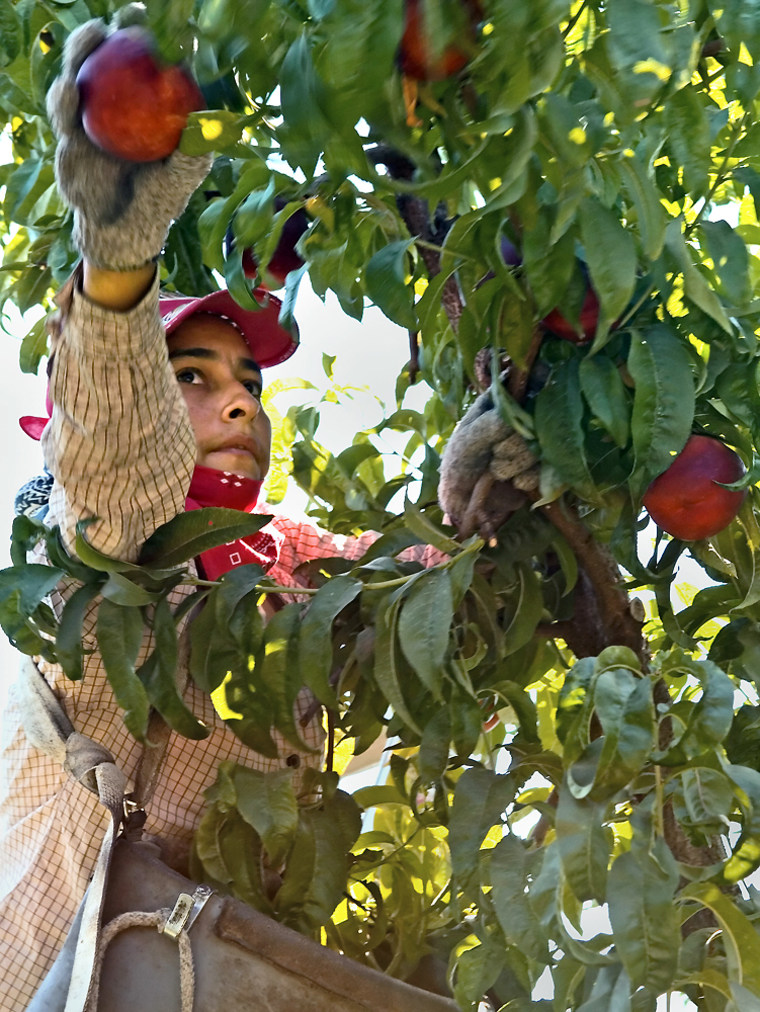A major fruit company has decided to convert 100 percent of its stone fruit trees to organic farming practices, part of the ongoing push to meet consumers' insatiable demand for healthier food.
But Stemilt Growers Inc., a bit player in the stone fruit industry but one of the nation's leading apple suppliers, isn't waiting two years to capitalize on the switch. The company has created a new label — Artisan Naturals — to sell its naturally-farmed fruit, an effort to get a higher price for the fruit even if it can't yet come with an "organic" sticker.
"It's a fact that the organic market has exploded," said Lorna Christie, senior vice president of industry products and services for the Produce Marketing Association in Newark, Del. "Connecting your product to the consumers' demands or preferences — that's what this is all about. And it's not a bad strategy."
To be certified organic by the U.S. Department of Agriculture, growers must raise their crop free of bug killer or fertilizer for three years. Agricultural experts estimate the costs for growers at as much as 30 percent higher during the transition, and growers rarely get a higher return for the fruit during that time.
But higher costs don't appear to be deterring growers from changing their practices. The organic food industry has been growing at about a 20 percent clip annually.
In just the first six months of 2007, 130 growers in Washington state alone applied to be certified as organic operations. According to a Washington State University study, organic tree fruit acreage in the state is expected to increase by 54 percent by 2008.
Stemilt expects its organic tree fruit acreage to double by 2009.
At southeast Washington's Graystone Orchards north of Pasco, a handful of farmworkers weave through a field of nectarine trees, selectively picking the fattest, juiciest fruit for harvest.
Several rows over, acres of peaches and pluots await picking.
The orchard is in its second year of transition to organic, but the fruit will be sold under Stemilt's Artisan Naturals label, promoting its naturally-farmed history.
"On produce, food safety is an expectation, and I think the organic sector has higher expectations and we understand that, but we think for naturally-farmed products, the first expectation is flavor," said Roger Pepperl, Stemilt director of marketing. "We get a little more because it's a premium product, and we position it as being a premium product.
"But people assume good things when they hear natural, naturally farmed," he said.
Sounds like Stemilt has done its homework, Christie said. Surveys show that while consumers want to eat healthy, flavor and taste remain the leading factors in their product choice.
"Everyone's looking for the tomato that tastes like their grandmother's garden," she said. "It wouldn't surprise me if some companies started creating subbrands to note the special care and handling that might be provided to a transitional product."
Jon Alegria, vice president and director of operations for CPC International Apple Co. in Tieton, said he's heard mixed reviews about the idea in recent years. The company, which packs apples, peaches and nectarines, has been certified organic for about seven years and about 8 percent of its product is organic.
"I've heard some cases where there is a premium for transitional fruit, but I've not seen it. They've been paying what they would for conventional," he said. "That doesn't mean there aren't deals or marketing plans out there. Makes a lot of sense, to be honest with you."
An estimated 3 percent of all grocery-store sales are organic products, but only about half of one percent of U.S. farmland is certified organic.
Demand is outpacing supply, and government policies don't do enough to encourage farmers to increase their costs to raise organic crops, said Ronnie Cummins, national director of the nonprofit Organic Consumers Association in Finland, Minn. The solution is to pay a premium during their three-year transition period.
"You need a label that says transition to organic, that would mean a farmer or producer has signed a contract with one of USDA's certifiers," Cummins said.
Others counter that most consumers aren't savvy enough to know the difference between conventional or transitional fruit, and that stops most retailers from taking the extra effort to differentiate it.
"Even if we're selling directly to retail, they may be put some point-of-sale stuff out there that says it's transitional, but until they see the seal on it, they're probably not going to get the margin that would allow them to sell it for more," said Sara Clow, domestic commodity manager for San Francisco-based Pacific Organic Produce, the largest organic tree fruit marketer in the country.
Rather, Clow said, the effort is more on connecting buyers to the farmers, "trying to tell the story of the grower."
Transitional is a scientific term meaning almost, not quite, on the way to organic — and the flavor is there right now, Stemilt's Pepperl said.
"We've put a transitional label on the box, but that means nothing to anybody. Anybody who thinks it does is fooling themselves," he said. "We sell the fruit on being naturally farmed, because naturally-farmed products produce fantastic flavors. And people buy fruit for how it tastes."
Stemilt is a smaller, niche player in the stone fruit market, where California produces much of the nation's crop. But the company is a leading supplier of apples and expects as much as 25 percent of its apple crop to be organic in the next 10 years.
Companies' success during the run to organic will show in any extra returns while they're in transition, Pepperl said.
"And your prize, whether it's big, small or the same, is going to come three years from now," he said. "Either way, we're going to sell all of our soft fruit right now one way or the other."
